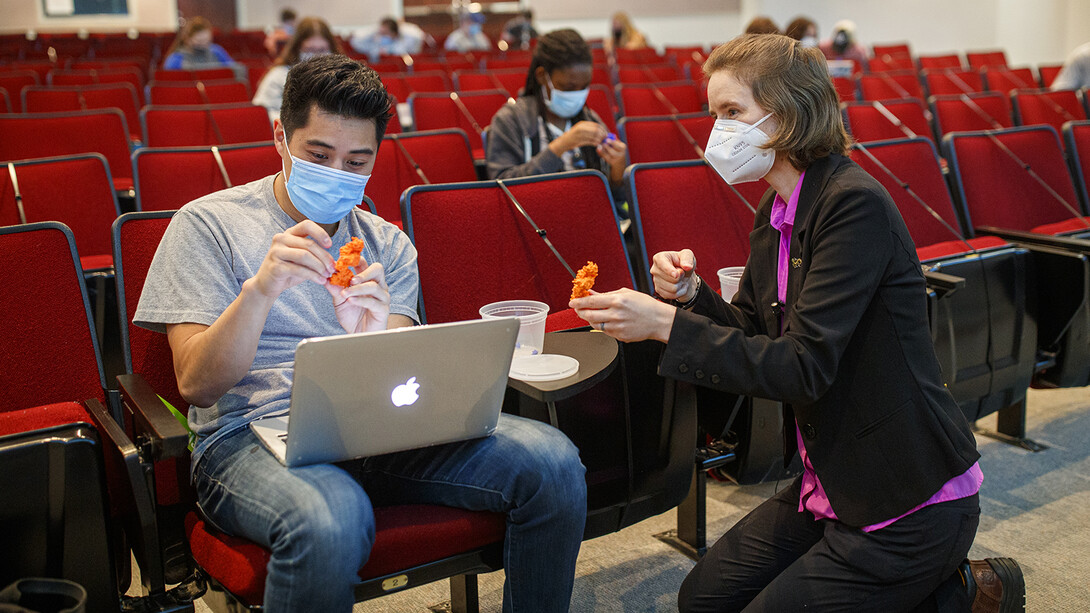
As the University of Nebraska–Lincoln moves forward with diversity planning, Nebraska Today is sitting down with college leaders to explore how inclusive excellence is being folded into day-to-day campus activities.
Since 2019, the university’s Office of Diversity and Inclusion has worked directly with institutional leaders in multiple ways, including through the Council of Inclusive Excellence and Diversity. Intended to connect colleges, primary campus units and ODI, the council is led by Nkenge Friday, assistant vice chancellor for strategic initiatives, with representation from across the institution.
The work of the council has been pivotal in guiding diversity, equity and inclusion plans university-wide. And, momentum realized through the council is being featured in this Q&A series.
Today, we’re continuing the series with the College of Arts and Sciences, talking with Mark Button, dean, and June Griffin, associate dean for undergraduate education.
This question and answer series exploring campus diversity, equity and inclusion planning started prior to the State of Diversity address on Oct. 28 and continues into November. If your college, department or unit has a plan to feature, contact Troy Fedderson at tfedderson2@unl.edu or 402-472-8515.
What is the state of diversity, equity and inclusion planning in the College of Arts and Sciences?
(Response by Button)
The College of Arts and Sciences completed an 18-month, comprehensive strategic planning process in spring 2021. This was a unique period in which to plan for the next five years of the college given the intersecting and mutually amplifying crises of systemic racial injustice, the global health pandemic and climate change.
Specific goals and strategies dedicated to diversity, equity and inclusion have been integrated within each one of the six primary aims of the college. For example, related to our goals for student academic and career success, we are actively taking steps throughout the college to address equity gaps in retention and graduation for under-represented minority, first-generation and Pell eligible students.
The College of Arts and Sciences is committed to leading in inclusive excellence and diversity. Within this aim, our overarching goals include enacting and sustaining a culture that respects and honors the dignity of all; recruiting and retaining diverse faculty, staff, and students; and investing in education programs and research and creative projects that address systemic racism, sexism and heterosexism.
Are elements of the college’s plan already being implemented?
(Response by Button)
Many elements of our college’s plan that are focused on diversity, equity and belonging are already being implemented. For example, we have established a new CAS Cares fund that provides emergency financial assistance to support students — particularly under-represented minority, first-generation and low-income students — in addressing financial obstacles to graduation.
The Dean’s Office and all departments and schools in the college are working in close coordination with the Office of Diversity and Inclusion in support of our goals to recruit and retain diverse and under-represented faculty and staff. This includes our participation in the APLU ASPIRE program for inclusive excellence, diversity, and teaching in STEM fields.
There are several curriculum updates that have been completed or are in development in the college. A new distribution requirement in Human Diversity in U.S. Communities has been implemented. An innovative new minor in Racial Justice, Equity and Inclusion through the Institute for Ethnic Studies will enhance any major at UNL and help graduates thrive in a diverse workforce. We are also in the process of developing a new minor in Asian American Studies.
The Dean’s Office has created a new Strategic Priorities Grant initiative that provides up to $10,000 per semester to support and encourage research and creative activity focused on the college’s strategic aims and university grand challenges. This year, we are inviting proposals that advance new scholarship and creative projects dedicated to anti-racism and racial equity.
How are individuals in the college helping advance inclusive excellence?
(Response by Griffin)
All departments with Arts and Sciences are participating in a multi-year initiative called CAS UP! — The Challenge for Achieving Success in Undergraduate Programs — in which they collect and analyze data answering questions such as, “What are the equity gaps for students’ success (earning a grade other than D, F or W) in your unit’s courses over the last three academic years?” Working from a list of strategies to improve student learning and decrease equity gaps, faculty in each unit will select the most appropriate strategies for their unit and develop a detailed plan for implementing them. This project engages teaching faculty throughout CAS, so we anticipate it will lead to significant improvements in student learning and success.
For example, in one unit, the School of Global Integrative Studies earned a CTT grant to advance their “Closing the Equity Gap” project in which all faculty in nine key courses commit to contacting students who earn a D or F on an assessment within the first three weeks of the course and invite them to meet with them to discuss ways to improve performance. In addition, faculty choose from a list of evidence-based inclusive activities, such as normalizing pronoun preferences to create a climate of respect, using diverse images and examples, and intentional discussions of racism (as one example), to incorporate into their courses.
And, we are honored to have three accomplished faculty members — Kwame Dawes, Lory J. Dance and Sergio Wals — in the college providing valuable leadership to the campus in inclusive excellence as members of the Chancellor’s Anti-Racism Journey.
Is there a part of the plan that is most exciting to you and/or having a positive impact on the college?
(Response by Button)
We are especially excited about the overall alignment of the goals and specific strategies at UNL dedicated to inclusive excellence and anti-racism. The College of Arts and Sciences thought critically in the development and feedback process of our strategic plan to complement and build off of the university’s plan. Across each of the primary missions of the university — teaching, research and engagement/service — there is a lot of thoughtful and well-integrated coordination and action taking place within the university right now, and that motivates us.







